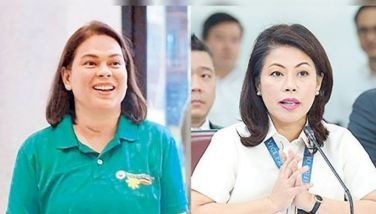6 mutineers’ habeas corpus plea junked
September 19, 2003 | 12:00am
The Court of Appeals (CA) has dismissed the petition for habeas corpus filed by the six young officers who led the July 27 mutiny in Makati City.
In a 14-page decision penned by Associate Justice Josefina Guevarra-Salonga on Wednesday, the CA’s 12th Division, however, ordered Armed Forces of the Philippines (AFP)- J2 (intelligence) chief Maj. Gen. Pedro Cabuay to adhere to his commitment in respecting the constitutional rights of the detained rebel soldiers, particularly visiting hours and the scheduled daily two-hour exercise.
The appellate court reminded Cabuay that he might face contempt for failure to comply with the order.
The CA pointed out "the concerns of the petitioners should not fall on deaf ears even if the writ of habeas corpus is unavailing in their case considering that the primordial end of this exercise remains to be the protection of the detainees’ constitutionally guaranteed rights."
The CA said the petition of habeas corpus is inapplicable in the case of the detention of the six young officers who were placed under military custody for leading the July 27 mutiny.
In the first place, their arrest and detention were not being questioned by their lawyers, the court said.
The six officers — Navy Lts. (sg) Antonio Trillanes IV and James Layug; Marine Captains Gary Alejano and Nicanor Faeldon, Army Captains Gerardo Gambala and Milo Maestrecampo — are still detained at the compound of the Intelligence Service of the Armed Forces of the Philippines (ISAFP) at Camp Aguinaldo.
The rest of the 300 servicemen who participated in the mutiny were also placed under court martial.
Charges of coup d’etat were also lodged against the mutinous officers and servicemen by the Department of Justice (DOJ) before the Makati City regional trial court.
The CA said the lawyers of the rebel officers led by Homobono Adaza and Roberto Rafael Pulido who filed the habeas corpus petition before the CA last month merely sought the protection and observance of their clients’ constitutional rights while in detention at the ISAFP.
The lawyers accused Cabuay and the military of preventing the detained officers to speak with their legal counsel aside from complaints that their letters have been opened.
The lawyers said the six officers were detained in isolation under unnecessary and prohibitive regulations.
The CA said there were no clear indications that the six officers were deprived of their constitutional rights to counsel and privacy and were subjected to cruel and unusual punishment.
The court cited the photographs and stipulations submitted by the military for inspection. "Except for detainees Gambala and Faeldon, each detainee is confined in separate cells. The conditions of the detainees while in their detention cells cannot, in any perspective, be considered inhuman, degrading and cruel in nature," the CA said.
The CA also took note of the ISAFP regulating the influx of visitors entering the maximum security compound.
At the same time, the court said the inspection of the letters, particularly that of Trillanes’ "could not be considered an illegal restraint since lawful authorities could interfere in one’s right to privacy for the sake of public safety and order."
"Prison authorities definitely have the right to inspect the materials being brought in and out the detention centers," the decision read.
The construction of physical barriers inside the ISAFP detention center would also fall within the discretion of the authorities managing the facility and could not be ordered removed as requested by the petitioners, the court added.
The petition for habeas corpus was originally filed before the Supreme Court but was referred to the CA for resolution as it ordered the military to produce the young officers for a hearing on the petition.
On Aug. 18, Cabuay presented the six officers and denied violating their constitutional rights while in custody.
During the Mass officiated by Bishop Teodoro Bacani at the St. Peter’s Parish on Commonwealth Avenue in Quezon City yesterday, relatives and friends of the six detained officers aired their appeal for the dismissal of the coup charges filed before the civilian court.
Over 500 of their relatives and friends who attended the Mass demanded from the government no less than their release.
The detained officers, for their part, sent a message they wanted to move to another detention facility outside ISAFP.
"The AFP acknowledges the pain and hardship being felt by the relatives and loved ones of those confined soldiers who participated in the failed mutiny. Nevertheless, as professional soldiers, they should accept that justice should be placed above compassion and emotion," AFP spokesman Lt. Col. Daniel Lucero said in a statement.
Lucero said justice should be served and the mutineers must be ready to face whatever the consequences. - With Jaime Laude
In a 14-page decision penned by Associate Justice Josefina Guevarra-Salonga on Wednesday, the CA’s 12th Division, however, ordered Armed Forces of the Philippines (AFP)- J2 (intelligence) chief Maj. Gen. Pedro Cabuay to adhere to his commitment in respecting the constitutional rights of the detained rebel soldiers, particularly visiting hours and the scheduled daily two-hour exercise.
The appellate court reminded Cabuay that he might face contempt for failure to comply with the order.
The CA pointed out "the concerns of the petitioners should not fall on deaf ears even if the writ of habeas corpus is unavailing in their case considering that the primordial end of this exercise remains to be the protection of the detainees’ constitutionally guaranteed rights."
The CA said the petition of habeas corpus is inapplicable in the case of the detention of the six young officers who were placed under military custody for leading the July 27 mutiny.
In the first place, their arrest and detention were not being questioned by their lawyers, the court said.
The six officers — Navy Lts. (sg) Antonio Trillanes IV and James Layug; Marine Captains Gary Alejano and Nicanor Faeldon, Army Captains Gerardo Gambala and Milo Maestrecampo — are still detained at the compound of the Intelligence Service of the Armed Forces of the Philippines (ISAFP) at Camp Aguinaldo.
The rest of the 300 servicemen who participated in the mutiny were also placed under court martial.
Charges of coup d’etat were also lodged against the mutinous officers and servicemen by the Department of Justice (DOJ) before the Makati City regional trial court.
The CA said the lawyers of the rebel officers led by Homobono Adaza and Roberto Rafael Pulido who filed the habeas corpus petition before the CA last month merely sought the protection and observance of their clients’ constitutional rights while in detention at the ISAFP.
The lawyers accused Cabuay and the military of preventing the detained officers to speak with their legal counsel aside from complaints that their letters have been opened.
The lawyers said the six officers were detained in isolation under unnecessary and prohibitive regulations.
The CA said there were no clear indications that the six officers were deprived of their constitutional rights to counsel and privacy and were subjected to cruel and unusual punishment.
The court cited the photographs and stipulations submitted by the military for inspection. "Except for detainees Gambala and Faeldon, each detainee is confined in separate cells. The conditions of the detainees while in their detention cells cannot, in any perspective, be considered inhuman, degrading and cruel in nature," the CA said.
The CA also took note of the ISAFP regulating the influx of visitors entering the maximum security compound.
At the same time, the court said the inspection of the letters, particularly that of Trillanes’ "could not be considered an illegal restraint since lawful authorities could interfere in one’s right to privacy for the sake of public safety and order."
"Prison authorities definitely have the right to inspect the materials being brought in and out the detention centers," the decision read.
The construction of physical barriers inside the ISAFP detention center would also fall within the discretion of the authorities managing the facility and could not be ordered removed as requested by the petitioners, the court added.
The petition for habeas corpus was originally filed before the Supreme Court but was referred to the CA for resolution as it ordered the military to produce the young officers for a hearing on the petition.
On Aug. 18, Cabuay presented the six officers and denied violating their constitutional rights while in custody.
During the Mass officiated by Bishop Teodoro Bacani at the St. Peter’s Parish on Commonwealth Avenue in Quezon City yesterday, relatives and friends of the six detained officers aired their appeal for the dismissal of the coup charges filed before the civilian court.
Over 500 of their relatives and friends who attended the Mass demanded from the government no less than their release.
The detained officers, for their part, sent a message they wanted to move to another detention facility outside ISAFP.
"The AFP acknowledges the pain and hardship being felt by the relatives and loved ones of those confined soldiers who participated in the failed mutiny. Nevertheless, as professional soldiers, they should accept that justice should be placed above compassion and emotion," AFP spokesman Lt. Col. Daniel Lucero said in a statement.
Lucero said justice should be served and the mutineers must be ready to face whatever the consequences. - With Jaime Laude
BrandSpace Articles
<
>
- Latest
- Trending
Trending
Latest
Trending
Latest
Recommended





























